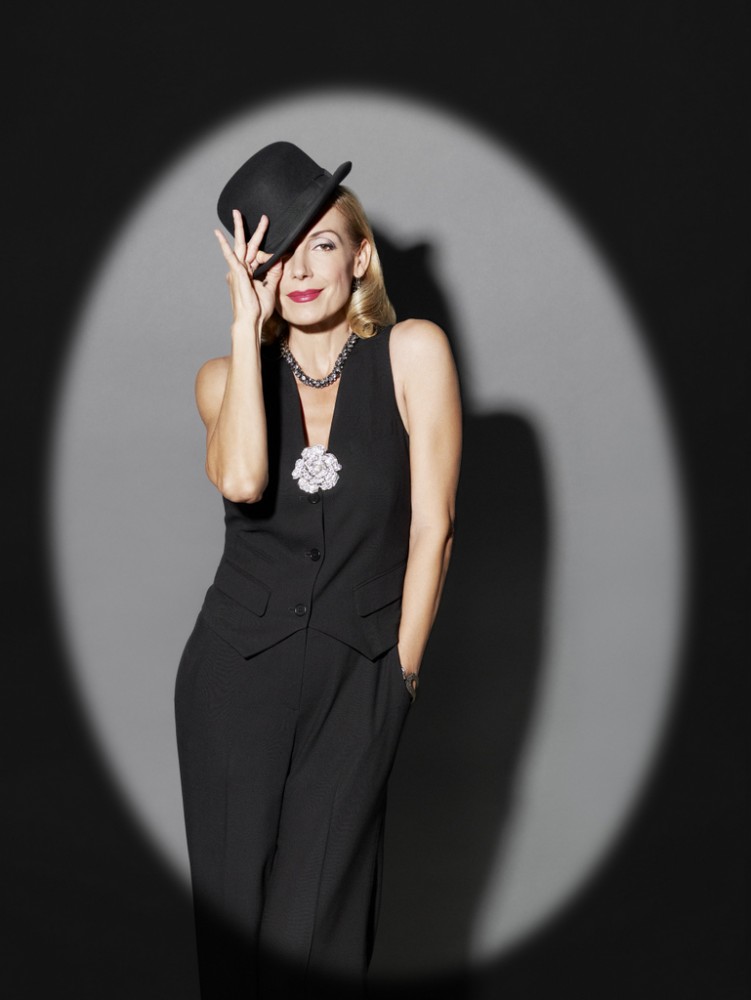In her cabaret show, “Rendezvous with Marlene,” which played Feinstein’s/54 Below November 27th and 28th this week,” German chanteuse Ute Lemper paid tribute to perhaps the greatest German chanteuse of them all: Marlene Dietrich. Backed by three superb musicians, Ms. Lemper spent much of the one hour and forty-five minute set embracing the persona of the legendary performer who, in her prime, was a unique presence on the world stage in a number of disciplines: cinema, cabaret and theatre. A flamboyant figure, she was a forceful presence throughout the 1930s and 40s, and on into the 50s and 60s.
Over the past few decades, Ms. Lemper has been in fine form herself, having created roles in the European premieres of a number of Broadway musicals, such as Cabaret, Chicago and Cats. She has also had a prolific career as a recording artist, with thirty CD’s produced over a thirty-year period. Her intention in creating this particular show, after years of performing all over the world as Ute Lemper, was revealed to me in an interview I conducted with her a few weeks ago, when she told me: “I care about her story. ‘Rendezvous with Marlene’ is the story I want to tell.” (For the full interview, it can be read here: https://theaterpizzazz.com/ute-lemper-talks-about-rendezvous-with-marlene/)
First appearing dressed all in black, with a white fur trim around her neck, Ms. Lemper virtually slinked onto the stage with a rendition of Pete Seeger’s anti-war song, “Where Have All the Flowers Gone?,” which Dietrich had turned into her own personal anthem. As Dietrich, she told us this was the year 1962, when in yet another of her many reincarnations, Dietrich had begun a world tour under the musical tutelage of a young (and then unknown) composer and arranger, Burt Bacharach. From this distinctive start, Ms. Lemper struck a chilly and defiant pose which she preserved, and did not vary, throughout the evening. As a portrait of an artist, it was dutiful and impressive. As entertainment, however—especially in an evening of this length—it proved somewhat of a trap.
For the first fifteen minutes, this icy impersonation kept us in rapt attention. Then Ms. Lemper introduced herself to the audience, and soon thereafter blended some of her own unique singing qualities with those of Dietrich, which was a smart choice. But the personal choice of not going into detail of what the two may have had in common (besides both being German-born), didn’t allow for things to go much beyond a level plane, narratively speaking, even if this was by design. For instance, Lemper has stated in print that “we were both kind of Expatriates and have a complicated relationship with our birth land.” But that fact was barely touched upon in the show. Instead, what we got was a rather straight-forward accounting of Dietrich’s career, aided by numerous asides that detailed her generous love life, which consisted of affairs with men and women. Nearly every song from Dietrich’s impressive canon were represented, with Ms. Lemper making sure that many were timed by way of their telling to advance Dietrich’s story. Unfortunately, this was done at great length, and the evening would have benefited by some judicial cutting and a tighter focus.
Though clearly fighting a cold last night, the very talented Ms. Lemper was still able to show off her extended contralto (a far superior instrument than the meager one Dietrich possessed), which made for some thrilling moments in such numbers as “La Vie en rose,” “The Laziest Gal in Town” and “Last Night When We Were Young.” Saving Dietrich’s one true signature for the end, “Falling in Love Again,” the song she introduced in her film debut in Josef von Sternberg’s The Blue Angel in 1930, made for a memorable turn (And in an aside, if there is anyone out there who can create the sound of a trumpet by trilling with her lips as wonderfully as Ms. Lemper, I would love to meet them).
The fine line between the dueling personas of Ute Lemper and Marlene Dietrich at Feinstein’s/54 Below were fully on display in this two-night engagement. If the show returns at some point, and this review has aroused some curiosity for you, then by all means make a plan to see “Rendezvous with Marlene.” It is a night of song and story that will surely have a nostalgic effect on you, and in some of Miss Lemper’s sultry renditions, will bring to mind why Dietrich was so special, by way of one of her most famous lines: “Americans are obsessed with sex. In Europe, we just do it.”



















